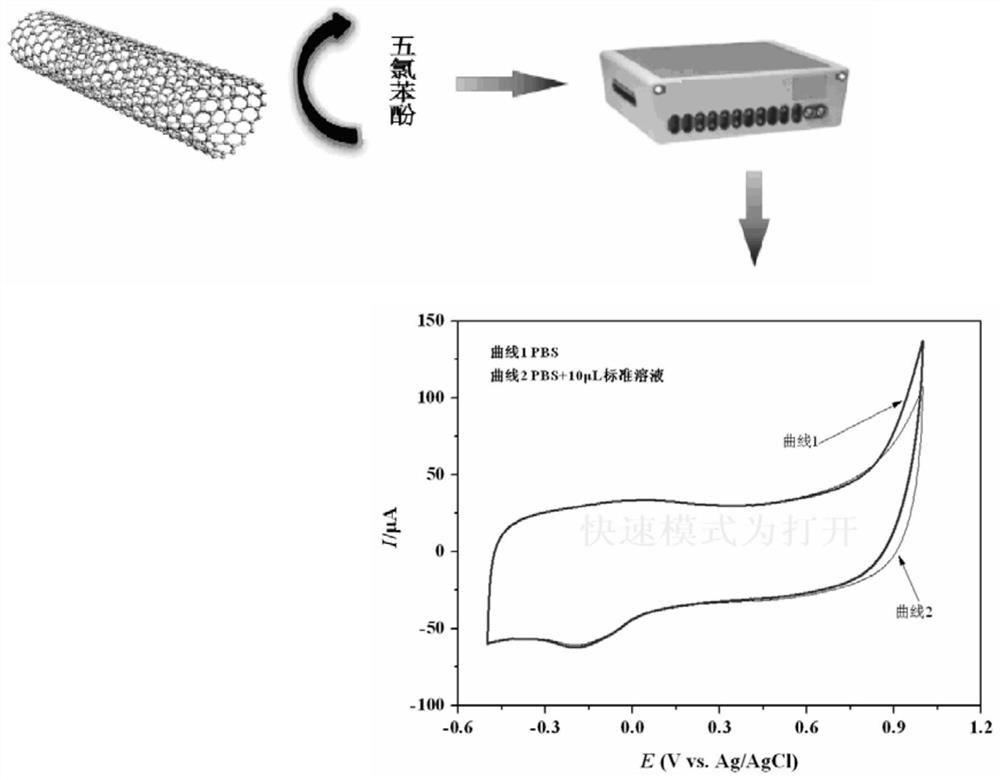A detection method for pentachlorophenol content in paper packaging materials
A paper packaging material, pentachlorophenol technology, applied in electrochemical variables of materials, analytical materials, material analysis by electromagnetic means, etc., can solve the problems of poor anti-interference, expensive instruments, long response time, etc.
- Summary
- Abstract
- Description
- Claims
- Application Information
AI Technical Summary
Problems solved by technology
Method used
Image
Examples
Embodiment 1
[0066] 1. Preparation of screen-printed carbon (SPCE) electrodes
[0067] The conductive silver paste was printed on the PET substrate to form electrode strips, and cured in an oven at 120° C. for 40 minutes to form a conductive silver layer. The conductive carbon paste was printed on the conductive silver layer, and cured at 71° C. for 30 minutes to form a carbon working layer. Covering insulating ink was printed on the conductive part in the conductive silver layer, and cured at 80° C. for 10 minutes to form an insulating layer. Finally, screen-printed carbon (SPCE) electrodes were prepared.
[0068] 2. Preparation of functionalized MWCNTs
[0069] Weigh 1 g of multi-walled carbon nanotubes (MWCNTs) and add it to 50 mL of 30% H 2 o 2 In the solution, ultrasound was applied for 4h to disperse the MWCNTs uniformly in the solution. Then, it was filtered with a 0.45 μm filter membrane, washed three times with ultrapure water, and dried in vacuum at 45° C. for 12 hours. Add...
Embodiment 2
[0073] 1. Preparation of functionalized monolayer graphene
[0074] Weigh 1 g of single-layer graphene and add to 50 mL of 30% H 2 o 2 In the solution, ultrasound was applied for 3 hours to uniformly disperse the single-layer graphene in the solution. Then, it was filtered with a 0.45 μm filter membrane, washed three times with ultrapure water, and dried in vacuum at 45° C. for 12 hours. Add the intermediate product of the above treatment to the mixed acid of nitric acid and sulfuric acid (HNO 3 :H 2 SO 4 =1:3), after 30 minutes of ultrasonication, reflux at 70°C for acidification reaction for 7 hours, to introduce oxygen-containing groups such as carboxyl and hydroxyl groups on the surface of single-layer graphene, to increase the water solubility of the material, and wash the product with ultrapure water until neutral , after drying in a vacuum oven at 45°C, the functionalized single-layer graphene material is obtained.
[0075] 2. Preparation of graphite electrodes ba...
Embodiment 3
[0078] 1. Preparation of functionalized nano-activated carbon
[0079] Weigh 1g of nano activated carbon and add to 50mL30%H 2 o 2 In the solution, sonicate for 5 hours, so that the nano activated carbon is evenly dispersed in the solution. Then, it was filtered with a 0.45 μm filter membrane, washed three times with ultrapure water, and dried in vacuum at 45° C. for 12 hours. Add the intermediate product of the above treatment to the mixed acid of nitric acid and sulfuric acid (HNO 3 :H 2 SO 4 =1:3), ultrasonication for 30min and then reflux at 90°C for acidification for 9h, to introduce oxygen-containing groups such as carboxyl and hydroxyl groups on the surface of nano-activated carbon to increase the water solubility of the material, and the product was washed with ultrapure water until neutral, and then After drying in a vacuum oven at 45°C, the functionalized nano-activated carbon material is obtained.
[0080] 2. Preparation of glassy carbon electrodes based on na...
PUM
 Login to View More
Login to View More Abstract
Description
Claims
Application Information
 Login to View More
Login to View More - R&D
- Intellectual Property
- Life Sciences
- Materials
- Tech Scout
- Unparalleled Data Quality
- Higher Quality Content
- 60% Fewer Hallucinations
Browse by: Latest US Patents, China's latest patents, Technical Efficacy Thesaurus, Application Domain, Technology Topic, Popular Technical Reports.
© 2025 PatSnap. All rights reserved.Legal|Privacy policy|Modern Slavery Act Transparency Statement|Sitemap|About US| Contact US: help@patsnap.com


